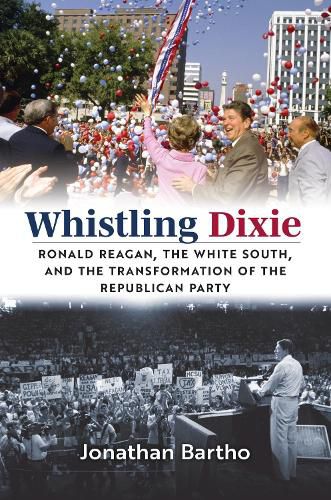Readings Newsletter
Become a Readings Member to make your shopping experience even easier.
Sign in or sign up for free!
You’re not far away from qualifying for FREE standard shipping within Australia
You’ve qualified for FREE standard shipping within Australia
The cart is loading…






Jonathan Bartho's Whistling Dixie explores the interdependent political relationship between Ronald Reagan and the white conservative South, a relationship that had a profound impact on Reagan's own career, on the political landscape of the South and the entire United States, and on the identity of the modern Republican Party. Millions of southerners were attracted to the GOP by Reagan's anti-statist ideology and their affection for the man himself-an affection that had been built over decades of appearances in the region. The support of these white southern conservatives was crucial to Reagan's political success, ultimately propelling him to the White House in 1980. Conversely, by supporting Reagan's presidential campaigns, southern conservatives were able to influence the direction of the Republican Party and begin restoring their region to a position of power in Washington.Bartho deftly provides a new perspective on Reagan's political career and the Republican Party of the Reagan era while detailing the often-rancorous philosophical differences between Reaganism and southern conservatism and the resulting political conflicts. Whistling Dixie highlights a divide in the Republican Party and in American conservatism that has often been overlooked-a divide that laid the foundations for the GOP's southernization and ultimately led to the rise of Donald Trump.
$9.00 standard shipping within Australia
FREE standard shipping within Australia for orders over $100.00
Express & International shipping calculated at checkout
Jonathan Bartho's Whistling Dixie explores the interdependent political relationship between Ronald Reagan and the white conservative South, a relationship that had a profound impact on Reagan's own career, on the political landscape of the South and the entire United States, and on the identity of the modern Republican Party. Millions of southerners were attracted to the GOP by Reagan's anti-statist ideology and their affection for the man himself-an affection that had been built over decades of appearances in the region. The support of these white southern conservatives was crucial to Reagan's political success, ultimately propelling him to the White House in 1980. Conversely, by supporting Reagan's presidential campaigns, southern conservatives were able to influence the direction of the Republican Party and begin restoring their region to a position of power in Washington.Bartho deftly provides a new perspective on Reagan's political career and the Republican Party of the Reagan era while detailing the often-rancorous philosophical differences between Reaganism and southern conservatism and the resulting political conflicts. Whistling Dixie highlights a divide in the Republican Party and in American conservatism that has often been overlooked-a divide that laid the foundations for the GOP's southernization and ultimately led to the rise of Donald Trump.